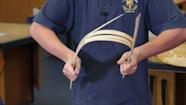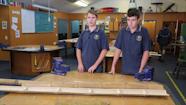Steve Andrew lets the students see, feel, and play with products to develop their understandings in materials.
Play, experiment, explore
Transcript
From my trade background I was involved in automotive, worked for General Motors for a while in Hamilton, so the materials side of things just come naturally. They kind of give me an interest and quite a good knowledge base about a lot of things that I could bring to teaching. And you know over the years I’ve probably introduced a lot of that stuff and I haven’t been afraid to approach it and have a go at it, and I think that’s really important.
One of the things that our school decided to do many years ago was to introduce technology using as many practical experiences we could for our students. They want to be able to feel things and touch things and play with things. Introducing the knowledge strand or the tech products component has been really good in that respect because there’s so many products and things around that we can look at and we can read and we can make decisions about.
I regularly talk to my boys about wheels because I believe that wheels are such a good product to think about. I bring in things regularly that I see. I bring in articles out of newspapers that I find, I bring in products that I’ll just find and I’ll think “oh that’s different”. Got a good connection with industry in the Waikato and they regularly open their doors to us to have a look and I generally scoop up a lot of stuff when I’m there. Whether it’s, you know, recycled plastic bags, eco-friendly plastic bags, right through to plastic injection moulders – stuff for examples that we use.
I also try and promote the students to bring stuff in as well, so that they can come in and talk about the stuff that they’ve found, and quite often they will say to me “Sir, I couldn’t bring it in but did you see that thing on TV?” or “Did you read that thing in the paper about such and such?”
These are my text books. These are the things that I like to teach my students. Sometimes they are directly related to the project that we’re producing, so it might be something to do with our weather stations and we might be looking at ways of catching the water. But other times it could be something that is not related to our project or the unit of work that we’re doing, it could be just something that I’ve found and that we want to talk about, and that we learn things about.
And they are always available in the workshop for the boys to pick up and play with. And once they’ve been around for a while I always, I generally leave them on the wall in my workshop so that they are still there to generate the thinking that we’re trying to produce in the workshop.
So just to reinforce those things that I’ve talked about, I think it’s really important that we use these existing products as a teaching tool because they are hands on for our boys, they are practical experiences. Whether it’s a bike or a lawnmower or a, just a simple handheld thing, they are really interested in it. They can see it, they can hold it, and it tells them a story and they like that.
Related videos
Combining knowledge and practice (01:58)
Steve Andrew explains how understanding materials is essential for effective technological practice.
Linking hands-on experiences and understandings (03:54)
Hands-on experiences allow the students to see materials understandings in action.
Finding materials to meet the specs (02:36)
Steve Andrew shares how students identify material specifications in a brief and then test materials to find those that are suitable....
School–industry relationship cuts both ways (03:36)
Steve Andrew and Terry Rillstone describe the way the relationship between St John's College and The Shop has benefits for them both....
Pushing the boundaries with materials (02:53)
Steve Andrew describes how his senior students have the confidence to select and work with unfamiliar materials.
Exploring unfamiliar materials (02:44)
Year 12 students from St John's College describe what they know about bamboo and how they are applying this knowledge to their projects....
Students and teachers talk about testing materials in year 11.
Manipulating, forming, and transforming
Students in year 10 describe manipulating, forming, and transforming materials.
Evaluating materials for an outcome
Steve Andrew and students talk about using their knowledge to test materials for their projects at year 12.
Year 10 students describe some of the attributes for the snake skates they are developing.
Senior students select their own issues
Year 12 students talk about the issues that they have selected for their projects.











